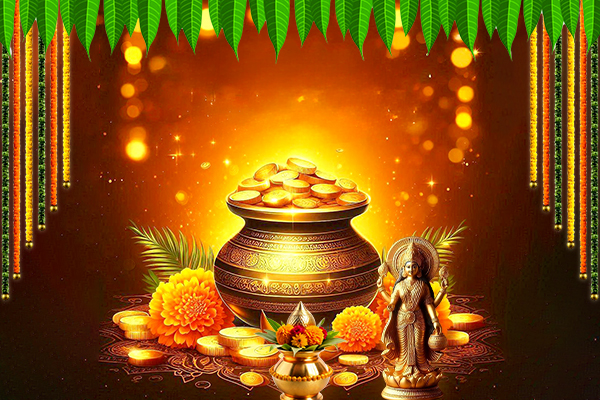
Akshaya Tritiya, also revered as Akha Teej, is an immensely auspicious and spiritually significant occasion, deeply venerated by the Hindu and Jain communities. Falling on Wednesday, April 30th, this sacred day is believed to be endowed with divine blessings, making it the most propitious time to embark on new endeavors, whether spiritual or material, ensuring their unwavering success. The day holds unparalleled power for those engaged in spiritual disciplines such as meditation, yoga, Japa (chanting of divine names), and the study of sacred scriptures.
Vedic wisdom emphasizes that moments of great auspiciousness must be diligently harnessed to cultivate spiritual merit and divine grace. This is accomplished through the reading of scriptures, performance of special pujas, worship of one’s Ishta Devata (chosen deity), acts of charity, paying homage to one’s ancestors, associating with saintly devotees, feeding Brahmins, planting and nurturing trees, aiding the underprivileged, and sponsoring educational initiatives. Engaging in such meritorious deeds on this sacred occasion enhances one’s inner spiritual strength, fortifying the ability to fulfill one’s prescribed duties with greater devotion and determination.
Consequently, Akshaya Tritiya bestows not only profound spiritual elevation but also enduring material prosperity, making it an unparalleled occasion for those seeking divine favor and holistic well-being.
Akshaya Tritiya 2026 Festival Date, Time, Muhurat & Tithi
Akshaya Tritiya will be observed on Sunday, April 19, 2026.
Tritiya Tithi of Shukla Paksha in Vaishaka month as per the lunar calendar.
Key Timings for Akshaya Tritiya 2026:
Akshaya Tritiya Puja Muhurat -
10:49 AM to 12:38 PM
Duration
- 01 Hour 49 Mins
Tritiya Tithi Begins
- 10:49 AM on Apr 19, 2026
Tritiya Tithi Ends
- 07:27 AM on Apr 20, 2026
Note: Sunrise and sunset vary by region and date due to India's geographical diversity. For exact timings, please refer to local astronomical data.
Importance & Significance of Akshaya Tritiya
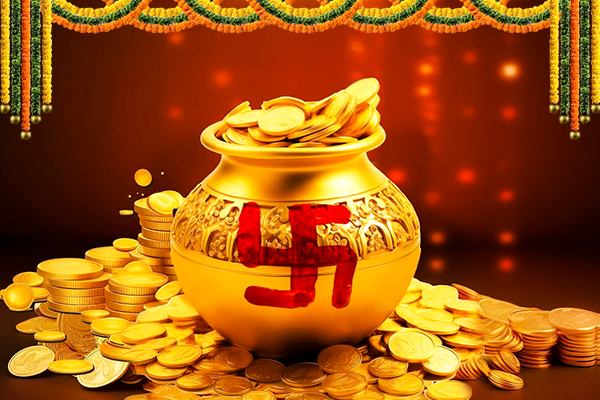
The festival of Akshaya Tritiya holds an exalted position in the spiritual and cultural ethos of the Hindu and Jain traditions, embodying the timeless principles of imperishability, auspiciousness, and boundless prosperity. This sacred day, deeply venerated in Vedic wisdom, derives its very essence from the Sanskrit term ‘Akshaya’, which is a fusion of ‘A’ (not) and ‘Kshaya’ (diminish or erode), signifying that which is eternal, inexhaustible, and undiminished.
The significance of this day transcends mere ritualistic observances, as it is a celestial juncture wherein every righteous action performed bears perpetual and ever-multiplying rewards, unaffected by the passage of time. Be it acts of charity, devotion, meditation, ancestral offerings, or the commencement of new ventures, all endeavors undertaken on Akshaya Tritiya are believed to usher in abundant blessings, spiritual merit, and material prosperity that extend far beyond this present lifetime.
Vedic philosophy classifies human activities into two broad categories, material (physical, worldly) and spiritual (metaphysical, transcendental). The pursuits driven by material ambition, though essential for worldly sustenance, remain ephemeral, perishable, and subject to the inexorable cycle of decay and renewal. Wealth, power, and earthly success, despite their apparent significance, are ultimately transient and fleeting.
In contrast, those actions that align with the eternal nature of the soul, grounded in dharma, wisdom, and spiritual realization, are imperishable and transcend the boundaries of time. Akshaya Tritiya, being a day infused with the divine principle of imperishability, amplifies and preserves all actions performed in the pursuit of spiritual upliftment, selfless service, and devotion, ensuring that their merit never diminishes but rather multiplies across lifetimes.
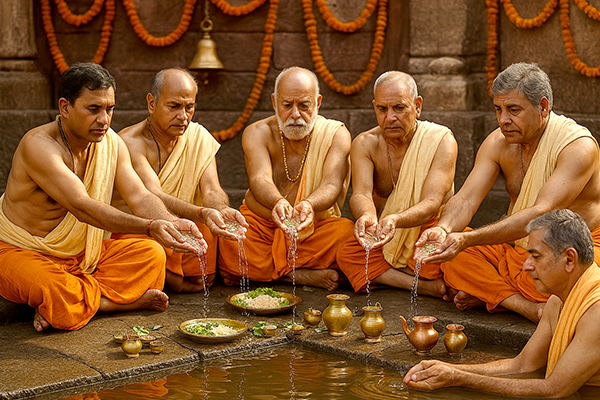
Vedic scriptures extol this sacred occasion as a day most conducive for enhancing one’s spiritual wealth and invoking divine grace. Engaging in meditation (Dhyana), sacred chanting (Japa), performance of Vedic fire sacrifices (Yajna), offerings to ancestors (Pitra-Tarpan), and acts of charity and righteousness (Dan-Punya) on this day yields unfailing and everlasting benefits. It is believed that donations made to the less fortunate, contributions toward dharmic causes, and selfless acts of kindness bring about manifold rewards, fostering both material abundance and inner illumination. The practice of giving, especially in the form of food, clothing, knowledge, and financial assistance, is regarded as particularly meritorious, ensuring unbroken prosperity, divine protection, and the purification of karma.
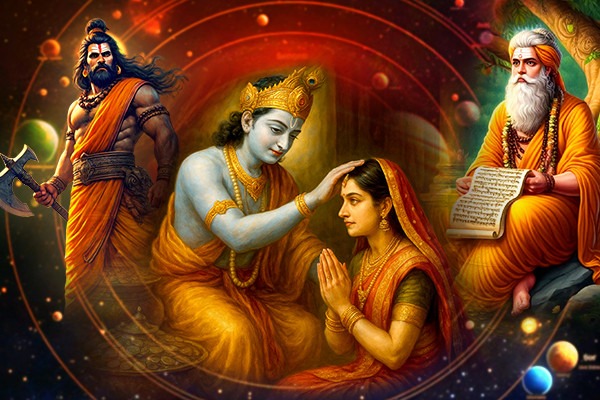
The historical and mythological significance of Akshaya Tritiya further reinforces its auspicious nature. It is believed that on this sacred day, Bhagwan Parashurama, the sixth incarnation of Vishnu, descended upon the earth to uphold righteousness. This day is also commemorated as the occasion when Bhagwan Krishna granted boundless wealth to Draupadi in the Mahabharata, ensuring that her divine vessel, the ‘Akshaya Patra,’ would never run empty. Additionally, it is on this day that the Treta Yuga commenced, and sage Ved Vyasa began the composition of the epic Mahabharata. In Jain tradition, this day marks the momentous occasion when Bhagwan Rishabhadeva, the first Tirthankara, broke his year-long fast with a humble offering of sugarcane juice, emphasizing the virtues of self-restraint, penance, and devotion.
For countless devotees, Akshaya Tritiya represents a golden opportunity to engage in sacred observances, seek divine grace, and set in motion positive transformations in life. Whether through spiritual practices, charitable contributions, honoring one’s ancestors, or embarking on noble endeavors, every righteous act performed on this day is believed to yield abundant blessings that remain eternally fruitful. This sacred festival, therefore, serves as an occasion not merely for material prosperity but for the enrichment of the soul, the cleansing of past karma, and the attainment of higher wisdom. It is a day when the celestial energies favor those who walk the path of virtue, ensuring that their efforts bear fruit that is truly Akshaya: imperishable, infinite, and ever-flourishing.
For this reason, devotees make it a priority to observe acts of devotion, reverence, and generosity on this auspicious day, as it is considered a golden opportunity to accumulate spiritual wealth and eternal virtue. Whether it is by engaging in sacred rituals, supporting charitable causes, honoring one's ancestors, or undertaking new ventures, Akshaya Tritiya remains a day of boundless blessings, where every righteous deed bears fruit that never diminishes.
History of Akshaya Tritiya Festival
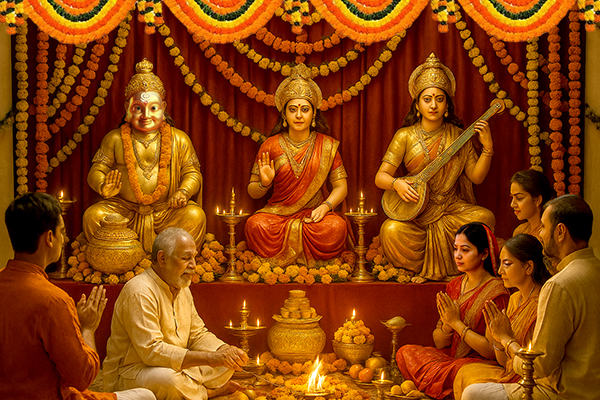
Throughout history, one of the most widely observed customs on Akshaya Tritiya has been the purchase of gold, a practice deeply intertwined with the ideals of prosperity, auspiciousness, and enduring wealth. This revered tradition arises from the ancient belief that any virtuous activity undertaken on this sacred day bears imperishable and ever-multiplying benefits.
Since gold is universally regarded as a symbol of purity, affluence, and divine grace, acquiring it on this auspicious occasion is believed to invite continuous financial stability, growth, and spiritual well-being into one’s life. The radiant luster of gold is often associated with the blessings of Mahalakshmi, the celestial bestower of abundance, making its acquisition on Akshaya Tritiya an act of invoking divine favor.
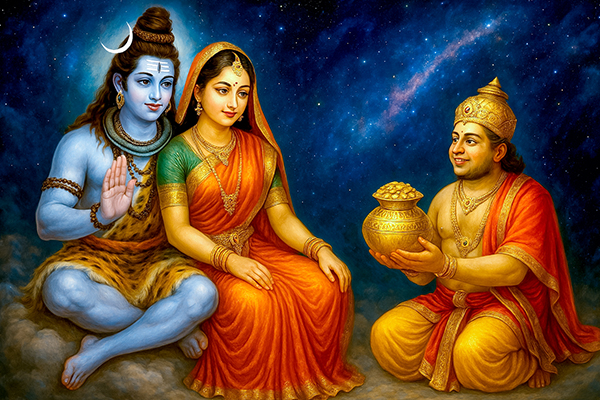
The sacred connection between Akshaya Tritiya and gold is deeply rooted in Hindu mythology and Vedic scriptures. According to ancient legends, on this very day, Bhagwan Kubera, the divine treasurer of the celestial realms, was granted immense and endless wealth by Bhagwan Shiva as a reward for his unwavering devotion and righteous conduct. It is also believed that on this occasion, Lakshmi Devi, the supreme deity of wealth and fortune, bestows her benevolent grace upon those who acquire gold with a pure heart and noble intentions. The belief that gold purchased on this sacred day remains eternally fruitful and undiminished has led to its widespread observance as an act of financial and spiritual prudence.
Beyond its material value, gold holds a profound spiritual significance, symbolizing divine radiance, purity, and auspiciousness. For generations, families have invested in gold jewelry, coins, and bars on Akshaya Tritiya, not merely as financial assets but as sacred heirlooms meant to be passed down through generations. This practice is particularly observed in the context of marriage and familial prosperity, where new brides and married women are often gifted gold ornaments as a blessing for a harmonious and prosperous marital life. The act of gifting gold is considered an expression of love, respect, and goodwill, reinforcing the belief that gold is not merely an object of wealth but an embodiment of divine energy and eternal fortune.
In modern times, while the essence of this tradition remains unchanged, its forms of observance have evolved. With advancements in financial instruments, people now invest in gold bonds, digital gold, exchange-traded funds (ETFs), and other asset-backed financial products linked to gold. Whether in its physical form or digital manifestation, the fundamental belief remains steadfast—that gold acquired on Akshaya Tritiya will never lose its value and will continue to bring prosperity, stability, and security. Many individuals also view this as an opportune moment to begin long-term financial planning, aligning their investments with the principles of dharma, prudence, and responsibility.
Thus, Akshaya Tritiya is not merely an occasion for material acquisition but a sacred reminder of the delicate balance between wealth and righteousness. It teaches that true prosperity lies not only in accumulating riches but in using them wisely, sharing them with generosity, and preserving them with integrity. The tradition of buying gold on this day serves as a testament to the enduring wisdom of Vedic teachings, where wealth is regarded as a divine blessing—one that must be nurtured, honored, and utilized for the greater good of society.
Akshaya Tritiya in Modern Financial and Spiritual Life

In the contemporary world, Akshaya Tritiya continues to hold profound significance, not only as a day of divine auspiciousness but also as an opportunity to cultivate financial prudence and spiritual wisdom. While traditionally associated with the purchase of gold, the essence of this sacred occasion extends beyond material wealth, guiding individuals toward a holistic approach to prosperity that harmonizes economic well-being with dharma (righteousness), ethical conduct, and selfless giving.
The Convergence of Material Prosperity and Spiritual Wisdom
In Vedic philosophy, true prosperity is never solely measured in monetary wealth; rather, it is the harmonious alignment of material success with ethical integrity, generosity, and spiritual evolution. Akshaya Tritiya, being rooted in the principle of imperishability, serves as a reminder that material affluence must be guided by dharma (righteous conduct) and the greater good.
The modern world often equates success with accumulation, yet ancient wisdom emphasizes distribution and responsible stewardship of wealth. The festival encourages individuals to view wealth as a divine blessing that should be nurtured with wisdom, shared with the needy, and utilized for meaningful contributions to society. This balance between Lakshmi (material prosperity) and Saraswati (spiritual wisdom) is the cornerstone of a truly flourishing life.
On Akshaya Tritiya, people are encouraged to:

- Invest wisely, ensuring that their wealth is safeguarded and multiplied through ethical and sustainable means.
- Engage in charitable giving, reinforcing the idea that true prosperity lies in what one gives, not just what one possesses.
- Cultivate a mindset of abundance rather than scarcity, recognizing that spiritual wealth, knowledge, and virtues are the highest forms of Akshaya (imperishable) treasures.
This understanding is particularly vital in today’s economic landscape, where financial stability must be cultivated alongside moral responsibility. By approaching wealth with an attitude of gratitude, stewardship, and ethical utilization, one ensures not only material growth but also inner fulfillment and divine grace.
Integrating Akshaya Tritiya’s Essence into Modern Life:
Ethical Wealth Management and Selfless Service

Beyond financial investments, Akshaya Tritiya is a reminder of the higher purpose of wealth, creating a positive impact on society. In the modern era, individuals can integrate the festival’s timeless principles into their lives in meaningful ways:
Financial Planning with Dharma:
- Instead of focusing solely on accumulation, individuals can plan their finances responsibly, ensuring that wealth is generated through ethical means.
- Investing in sustainable industries, ethical businesses, and social enterprises aligns with the Vedic ideal of responsible wealth management.
- Practicing mindful consumption and avoiding wastefulness reflect the spiritual essence of true prosperity.
Philanthropy and Charitable Giving:
- Donating to orphanages, educational institutions, hospitals, and dharmic causes ensures that wealth serves a greater purpose.
- Establishing scholarships, medical aid funds, or community development projects reflects the spirit of imperishable virtue (Akshaya Punya).
- Supporting environmental sustainability, rural empowerment, and cultural preservation initiatives aligns with the broader Vedic principle of universal welfare (Lokasangraha).
Integrating Righteousness into Business and Work:
- Entrepreneurs and professionals can commit to ethical business practices, ensuring that their success uplifts society rather than exploiting it.
- Encouraging fair wages, employee well-being, and community development initiatives aligns business success with spiritual virtue.
- Corporate social responsibility (CSR) initiatives that support education, healthcare, and social welfare resonate with the spirit of Akshaya Tritiya, making businesses both profitable and purpose-driven.
Thus, Akshaya Tritiya in the modern world is not merely a day for purchasing gold but a reminder of the eternal principles of righteous prosperity, responsible wealth management, and altruistic service. Whether through financial investments, philanthropic acts, or ethical professional conduct, individuals can ensure that their success remains truly Akshaya—imperishable, ever-growing, and spiritually fulfilling.
Akshaya Tritiya transcends time, economy, and geography, reminding humanity that wealth, when pursued with wisdom and shared with compassion, becomes an eternal source of blessings. As financial markets evolve and digital investments rise, the festival’s core message remains unchanged, prosperity is most meaningful when it is rooted in dharma, generosity, and spiritual awareness.
By integrating these principles into modern life, one does not merely acquire wealth but cultivates a legacy of abundance, virtue, and eternal grace.
What to do on Akshaya Tritiya
Akshaya Tritiya is revered as one of the most auspicious and spiritually potent festivals in the Hindu calendar, signifying a day of manifold blessings and inexhaustible prosperity. It is believed to be the day when Treta Yuga commenced, following Satya Yuga and preceding Dwapara Yuga and Kali Yuga.
This sacred occasion is marked by the conviction that any righteous or charitable act performed on this day yields multiplied and everlasting rewards, making it an opportune moment for devotees to engage in acts of devotion, generosity, and new beginnings.
Performing Puja and Rituals
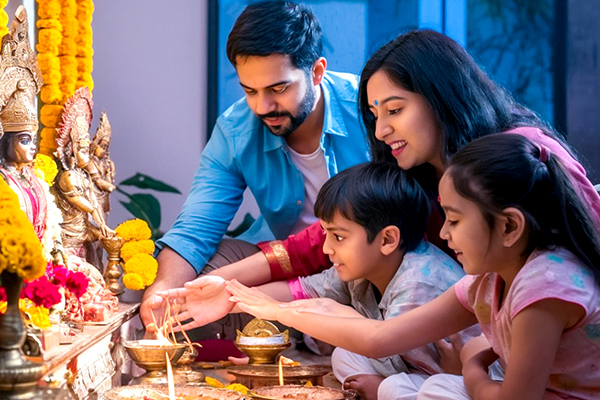
Devotees begin the day by waking up early, taking a sacred bath, and offering prayers to
Bhagwan Vishnu
and Goddess Lakshmi, as they are the principal deities associated with Akshaya Tritiya. A special Vishnu Puja is performed, wherein an idol or image of Bhagwan Vishnu is adorned with flowers, sandalwood paste, and sacred offerings. Devotees recite Vishnu Sahasranama (the thousand names of Bhagwan Vishnu), Lakshmi Stotra, and other sacred hymns, seeking divine grace for unending prosperity and happiness.
Many also observe fasting on this day, either as a partial fast (phalahar) or complete fast (nirjala), as a means of spiritual purification and devotion. Offering water to the Sun God (Surya Arghya) and donating cooling elements like buttermilk, sugar, and watermelon are also considered highly meritorious, particularly in regions experiencing the scorching heat of summer.
Buying Gold and Precious Metals
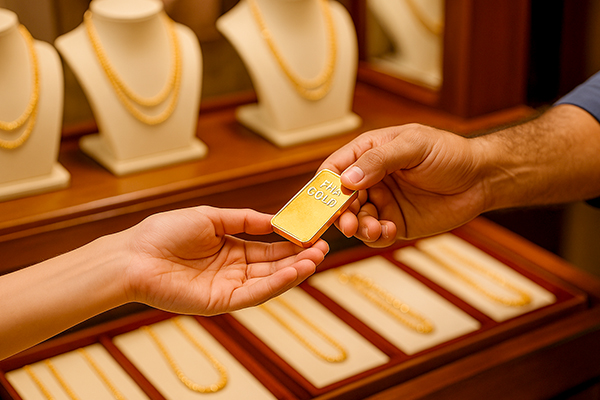
A major tradition associated with Akshaya Tritiya is the purchase of gold, silver, and other precious metals, as it is believed to invite endless fortune, prosperity, and divine grace. The presence of gold in one’s household is symbolic of Goddess Lakshmi’s blessings, and buying it on this day ensures uninterrupted financial growth and stability. This practice is deeply rooted in the belief that wealth acquired on this day remains inexhaustible and ever-growing. Many families purchase gold coins engraved with images of Goddess Lakshmi or Bhagwan Ganesha, which are later used in Diwali Lakshmi Puja for continuous prosperity.
Engaging in Spiritual Activities
Akshaya Tritiya is an ideal occasion for deepening one’s spiritual journey. Devotees engage in meditation, mantra chanting, japa (repetition of divine names), and scriptural reading, believing that spiritual efforts made on this day yield imperishable and multiplied benefits. Many read from Bhagavad Gita, Ramayana, Mahabharata, and Vishnu Purana, as these texts hold timeless wisdom for righteous living. Kirtans (devotional singing) and satsangs (spiritual discourses) are also conducted, filling the atmosphere with divine vibrations and sacred energy.
Beginning New Ventures and Investments

Since Akshaya Tritiya is free from malefic planetary influences, it is considered an extremely auspicious day to begin new ventures, business deals, and financial investments. People start new businesses, sign important contracts, initiate construction projects, and make significant purchases, believing that anything begun on this day will lead to success and long-term growth. Farmers often begin plowing their fields, and many opt for property investments, vehicle purchases, and career advancements, aligning their endeavors with the festival’s promise of perennial success and stability.
Marriage and Auspicious Life Events
Akshaya Tritiya is also regarded as an excellent occasion for marriages, as it is considered a Swayam Siddha Muhurat—a time inherently auspicious, requiring no additional astrological considerations. Weddings performed on this day are believed to be blessed with eternal happiness, prosperity, and harmony, making it a preferred date for many couples to tie the sacred knot. Besides marriages, ceremonies like upnayan sanskar (sacred thread ceremony), housewarming (griha pravesh), and naming ceremonies (namkaran) are also performed with great reverence.
Charity and Acts of Generosity
Giving charity (daan) and performing acts of kindness (punya) hold supreme importance on Akshaya Tritiya, as they bring everlasting merit and divine rewards.
The scriptures emphasize that offering food, clothes, money, and grains to the needy, donating to temples, and helping the underprivileged bring immense spiritual merit. Special Anna Daan (food distribution) events are organized in temples and ashrams, where devotees feed Brahmins, sages, and the less fortunate, ensuring that no one remains hungry on this sacred day.
Many also perform Pitra-Tarpan, an act of offering water and sesame seeds to one’s ancestors to seek their blessings and ensure their souls attain peace. This ancestral worship is considered highly auspicious, as it bestows blessings for lineage prosperity and familial harmony.
Following are the charities, Daanam, one can undertake:
- Jala Daanam: One can offer jala, water to Brahmins with betel nuts and donate to them dakshina, offerings in one's capacity.
- Shayana Daanam: One can donate beds to the needy or the underprivileged.
- Vasthra Daanam: Vasthra means clothes. One may donate clothes to the needy and be blessed with a long life.
- Kunkum daanam: Donating kumkum blesses the donor with higher status in life and the women are blessed with their husbands getting a longer life.
- Chandana daanam: Just like others mentioned above, donation of Sandalwood protects the donor from untimely accidents and inauspicious.
- Thamboolam: Giving Thamboolam, betel leaf, invites prosperity into one's life. Thamboolam epitomizes spiritual strength and prosperity. It is believed that the betel leaf was produced during the churning of the ocean aimed at extracting amrita, nectar and the leaf is also the abode of all the demigods.
- Naarikela Daanam: Donating Naarikela, coconuts to Brahmins relieve our ancestors from agonies of the underworld.
- Butter milk daanam : Offering butter milk as a charity blesses the donor with vidya prapti, attainment of knowledge.
- Udakumbha Daanam: Giving water contained in a bronze or silver vessel along with camphor, saffron, basil leaves (Tulasi) and betel nut assures one of having their desires fulfilled soon. Those who seek a suitable life partner, want to have a child and want to get rid of ancestral curses (Pitru Shraap), must perform this charity on Akshaya Tritiya.
- Padaraksha: Donating padaraksha, slippers, shoes, chappals or any footwear will ensure that the donor's life gets purified and is never subjected to entering Hellish planets after death.
- Chatra Daanam: Offering chatra, an umbrella to the needy removes unexpected obstacles from one's life.
- Holy Bath: Taking bath in the holy river rids one of all inauspiciousness and bad karmic reactions. One may take bath before sunrise in one of the Holy Rivers; Ganges, Yamuna, Godavari, Sindhu, Saraswati, Narmada, Krishna, Bhagirathi, Gandaki, Gomathi, Kaveri and Phalgu.
Apart from the above donations, one can also donate wheat which is believed to please the King of the Gods, Bhagwan Indra who is in charge of rains. And the sufficient rains help grow plants and vegetation on Earth, ensuring continuing prosperity.
Celebrating Akshaya Tritiya is a holistic blend of devotion, generosity, and auspicious beginnings, where spiritual and material pursuits are harmoniously aligned. Whether through puja, charity, gold purchases, or new ventures, this day serves as a reminder that righteous actions and divine faith lead to inexhaustible blessings and success.
By honoring traditions and performing meritorious deeds, devotees ensure that wealth, happiness, and spiritual merit flow abundantly, not just in this lifetime but across eternity.
Akshaya Tritiya Puja Vidhi (Puja Procedure)
.jpg)
The Puja Vidhi (ritual procedure) for Akshaya Tritiya is designed to invoke the grace of Bhagwan Vishnu and Goddess Lakshmi, ensuring wealth, spiritual upliftment, and success in all endeavors. Performing the Akshaya Tritiya Puja with devotion and sincerity is believed to bring unfading fortune, peace, and happiness into one’s life.
-
Purification and Preparation
Begin the day by waking up early during Brahma Muhurat (before sunrise) and taking a holy bath. If possible, add Ganga Jal (holy Ganges water) to the bathing water to purify the body and mind. Wear clean, preferably new or traditional attire and prepare the Puja altar by cleaning the area and arranging all required items for worship. -
Establishing the Puja Altar
Set up a sacred space for the puja in the northeast or east-facing direction. Place an idol or image of Bhagwan Vishnu, Goddess Lakshmi, and Bhagwan Ganesha on a clean cloth or wooden platform. If available, a Shaligram (sacred stone representing Bhagwan Vishnu) can also be placed for worship. Arrange flowers, incense sticks, diya (oil lamp), fruits, sweets, gold coins, and offerings near the deities. -
Sankalpa (Taking a Vow)
Before beginning the puja, fold your hands, close your eyes, and take a sankalpa (sacred vow). Mentally express your intentions and desires, seeking blessings for prosperity, success, and the removal of obstacles. Chant the Sankalpa mantra, dedicating the puja to Bhagwan Vishnu and Goddess Lakshmi. -
Invoking Bhagwan Ganesha
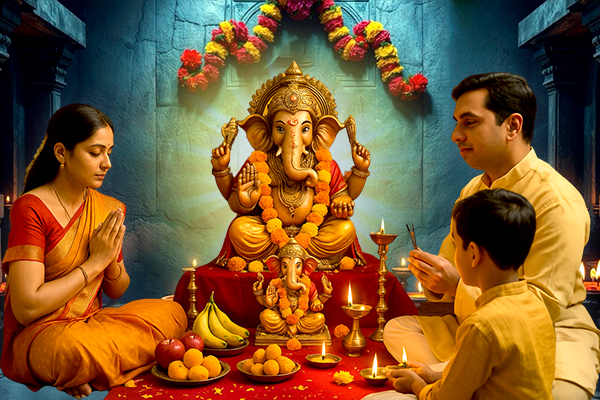
Begin the puja by worshiping Bhagwan Ganesha, the remover of obstacles. Light a ghee lamp and incense sticks while chanting 'Om Gan Ganapataye Namah'. Offer modaks, durva grass, and red flowers, seeking His blessings for an auspicious and uninterrupted puja. -
Worship of Bhagwan Vishnu
Next, invoke Bhagwan Vishnu, the preserver of the universe, by chanting 'Om Namo Bhagavate Vasudevaya'. Offer tulsi leaves, sandalwood paste, yellow flowers, and sweet offerings while reciting the Vishnu Sahasranama (1000 names of Bhagwan Vishnu) or the Shri Vishnu Ashtakam. Pour Ganga Jal or pure water over the idol or Shaligram in an abhishekam (holy bath) ritual. -
Worship of Lakshmi Devi
After Bhagwan Vishnu, offer prayers to Lakshmi Devi, the embodiment of wealth and abundance. Chant the Lakshmi Ashtottara Shatanamavali (108 names of Goddess Lakshmi) or Lakshmi Stotra. Offer sandalwood, lotus flowers, kumkum (vermilion), turmeric, rice grains, and sweets while seeking prosperity, financial stability, and divine blessings. -
Offering Gold and Charitable Deeds
On Akshaya Tritiya, offering gold or gold ornaments in the puja is considered highly auspicious, as it signifies endless prosperity. If possible, donate grains, clothes, food, and money to the poor and needy after the puja, as charity (daan) performed on this day ensures imperishable rewards and divine grace. -
Performing Yajna or Havan (Optional)
.jpg)
If feasible, a small Yajna (fire ritual) or Havan can be conducted. Light the sacred fire, chant Vedic mantras, and offer ghee, rice, and samagri (herbal offerings) into the flames while reciting Vishnu Gayatri Mantra or Lakshmi Mantra. This act purifies the surroundings and invites divine energy. -
Prasad Distribution and Aarti
Conclude the puja by performing an aarti for Bhagwan Vishnu, Goddess Lakshmi, and Bhagwan Ganesha. Sing the Vishnu Aarti and Lakshmi Aarti while waving a camphor lamp in circular motions. Finally, distribute the Prasad (sacred food offering) to all family members, symbolizing the acceptance of divine blessings. -
Observing Fasting and Spiritual Practices
Many devotees observe a full or partial fast on Akshaya Tritiya, consuming only fruits, milk, and sattvic food. Engaging in chanting, meditation, reading scriptures like Bhagavad Gita, and performing japa (mantra recitation) enhances spiritual merit on this divine day.
Performing the Akshaya Tritiya Puja with sincerity and devotion not only invites divine blessings of wealth and happiness but also ensures spiritual growth and inner fulfillment. This sacred day is an opportunity to align oneself with dharma, engage in selfless service, and seek the grace of Vishnu and Lakshmi, ensuring a life of prosperity, righteousness, and eternal peace.
Akshaya Tritiya Puja Mantras
On the auspicious day of Akshaya Tritiya chanting of Mantras is an integral part of performing Akshaya Tritiya Pooja. While performing Abhishekham and later too, keep chanting Bhagwan Vishnu, Goddess Lakshmi and Kuber Mantras.
While bathing in the morning this is a Mantra which can be chanted, honoring Ganga and other Rivers of India.
Gange Ca Yamune Caiva Godaavari Sarasvati |
Narmade Sindhu Kaaveri Jalesmin Sannidhim Kuru ||
Bhagwan Ganesha Mantra
Om Gam Ganapataye Namaha ||
Bhagwan Vishnu Mantras
Om Namo Narayanaya।।
or
Om Namo Bhagavate Vasudevaya।।
or
Shantakaram Bhujagashayanam Padmanabham Suresham Vishvadharam Gaganasadrisham Meghavarnam Shubhangam Lakshmikantam Kamalanayanam Yogibhirdhyanagamyam Vande Vishnum Bhavabhayaharam Sarvalokaikanatham।।
Chanting the Vishnu Saharanama, is highly recommended as it is a Stotram with the thousand (1000) names of Bhagwan Vishnu and is one of the best way to please, worship and honour Him.
Lakshmi Mata Mantras
Om Hreem Shreem Lakshmibhayo Namah॥
or
Om Shree Mahalakshmyai Cha Vidmahe Vishnu Patnyai Cha Dheemahi Tanno Lakshmi Prachodayat॥
Bhagwan Kuber Mantra
Om Yakshaya Kuberaya Vaishravanaya Dhanadhanyadhipataye Dhanadhanyasamriddhim Me Dehi Dapaya Svaha॥
Akshaya Tritiya Vrat Vidhi (Fasting Procedure)
Fasting on Akshaya Tritiya is considered highly auspicious, as it enhances spiritual merit and divine blessings. Observing a vrat (fast) on this sacred day is believed to bring prosperity, longevity, and eternal happiness while helping devotees attain purity of mind and body. The fast can be observed as a Nirjala Vrat (waterless fast), Phalahar Vrat (fruit-based fast), or a simple Satvik Vrat (light vegetarian meals) based on one’s ability and devotion.
- The vrat begins early in the morning with a holy bath, preferably in a sacred river or with water mixed with Ganga Jal (holy Ganges water).
- Devotees wear clean, traditional attire and sit in a peaceful space to take a Sankalpa (sacred vow) before commencing the fast.
- The Sankalpa is made by mentally affirming one’s devotion to Bhagwan Vishnu and Lakshmi Devi, seeking their blessings for prosperity, spiritual growth, and the removal of obstacles.
- Throughout the day, devotees engage in prayers, mantra chanting, and reading of scriptures such as the Bhagavad Gita, Vishnu Sahasranama, and Lakshmi Stotra.
- Many choose to observe a Nirjala Vrat, abstaining from both food and water, while others consume fruits, milk, and light sattvic meals to maintain their energy while upholding the sacredness of the fast.
- Grains, pulses, onion, garlic, and spicy foods are strictly avoided, ensuring that the body remains pure and in harmony with the spiritual energy of the day.
- The vrat is complemented by charity (daan) and acts of kindness, as giving alms on this day is said to yield imperishable rewards. Donating food, clothes, money, and gold to the underprivileged, feeding Brahmins, and providing water to thirsty travelers are considered highly meritorious and help in accumulating divine blessings.
- Performing Pitra-Tarpan (offering to ancestors) is also an essential part of the vrat, as it grants peace to the departed souls and strengthens familial prosperity.
- The fast is broken in the evening or the next morning after performing the Akshaya Tritiya Puja and offering Prasad to Bhagwan Vishnu and Lakshmi Devi.
- Devotees then consume sattvic food such as fruits, milk, honey, and simple home-cooked meals, ensuring that the vrat concludes with purity and gratitude.
Observing the Akshaya Tritiya Vrat with faith and devotion not only ensures material success and financial stability but also brings peace, happiness, and spiritual upliftment. It is a day dedicated to self-discipline, divine service, and righteous living, ensuring that one’s blessings remain inexhaustible and ever-growing.
Akshaya Tritiya Vrat Katha (Traditional Fasting Story)
.jpg)
Once upon a time, in the Dwapara Yuga, there lived a poor but devoted Brahmin named Sudama, who was a childhood friend of Bhagwan Krishna, the ruler of Dwarka. Despite his immense love for Krishna, Sudama lived in dire poverty, struggling to provide food for his wife and children. His wife, knowing of his deep bond with Krishna, urged him to seek help from the divine king, as Krishna never turned away a true devotee.
Sudama was reluctant at first, as he felt that true devotion should not be based on material desires. However, due to his wife’s persistence, he decided to visit Krishna in Dwarka. As a token of love, Sudama carried a small bundle of beaten rice (poha), which was all he could afford as an offering to his dear friend. Though it was humble, it was given with pure love and devotion.
Upon reaching Krishna’s palace, Sudama was overwhelmed by the grandeur and divine beauty of Dwarka. However, to his surprise, Krishna welcomed him with great affection, washed his feet, and offered him a royal seat. Bhagwan Krishna treated Sudama not as a poor Brahmin but as a dear brother and beloved friend. They spent hours reminiscing about their childhood and divine pastimes.
Krishna, seeing the bundle of beaten rice Sudama hesitantly carried, eagerly took it from him and ate a handful with great joy, considering it the most valuable offering. Before he could take a second handful, Goddess Rukmini (Krishna’s consort) stopped him, understanding that with just one handful, Krishna had already blessed Sudama with immense prosperity beyond imagination.
Unaware of Krishna’s divine blessings, Sudama returned home with a heart full of joy but empty hands. However, as he reached his village, he was astonished to see his small hut transformed into a grand palace, and his wife and children adorned in silken garments and precious jewelry. He realized that Krishna, in his infinite kindness, had showered him with inexhaustible wealth and happiness, despite him never asking for anything in return.
This incident, which is believed to have taken place on Akshaya Tritiya, symbolizes the power of pure devotion, selfless offerings, and unwavering faith in God. The story teaches that true wealth is not material riches but the blessings of the Divine, and any charity or devotional act performed on Akshaya Tritiya yields eternal and unlimited rewards.
Since that day, devotees observe Akshaya Tritiya Vrat, performing charity, fasting, and puja with a pure heart, believing that any offering made to God on this sacred day will never diminish but will only multiply, ensuring lifelong prosperity and spiritual fulfillment.
Puja Utensils, Essentials
Rudra Centre brings an extensive collection of Puja Articles which caters to all that is required for daily and special Puja Vidhis. We offer variants of designs and sizes in each category. The list includes handcrafted Puja Mandirs, Puja Pedestals, offering Bowls, Panchpatra, intricately carved Puja Thalis, Abhishek Vessels, in different materials, Pure Silver/German Silver articles like Kalash, set of Shodash Upachara and Several other Puja Articles, which we deliver at your doorstep.
Visit the complete collection:
Annapurna Yantra in Gold Finish
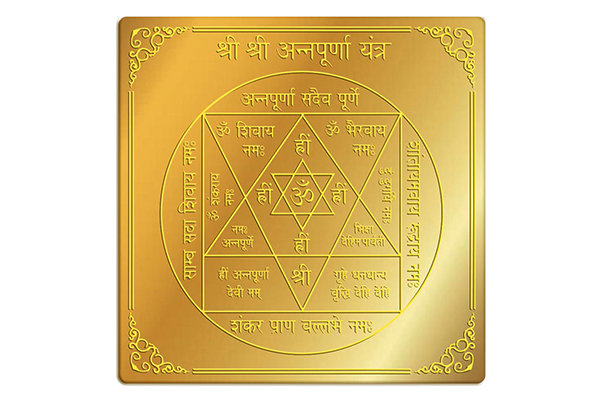
Worship of Annaupurna Yantra bestows health, wealth and prosperity. It fulfills the material requirements of the devotees but also spiritual needs. Married women can pray to Annaupurna Yantra for the long life of their husbands and wish for a happy married life. You will always find plenty of fresh and healthy food in households that are devoted to Maa Annapurna. Ancient scriptures also describe her as the source of knowledge, wisdom, spiritual energy, courage, and strength in body and mind. Annaupurna Yantra provides manifold benefits.
Shivling in Pure Gold (22K)
.jpg)
The beautiful Shivling in pure gold is made of 22-karat gold. 22 karat gold is also called 916 gold. It contains pure gold with a percentage of 91.67%. It also has a 916 hallmark. As a standard market practice, the remaining metal composition consists of mixed metals for better durability.
Rudraksha Chikna Mala with OM Design Gold 22K Caps
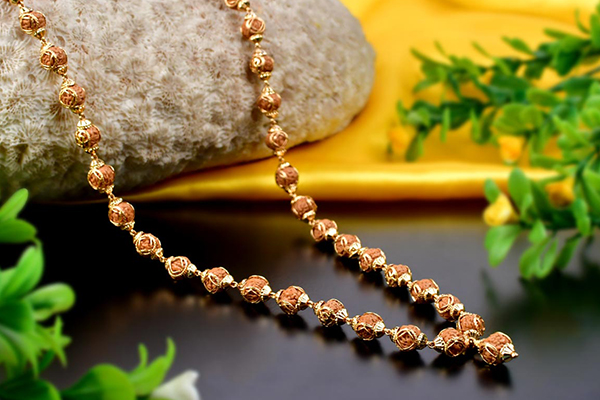
A highly auspicious mala for those who wish to align to their higher selves meaning Upa Guru. Also for those going through Guru (Jupiter) dosha, this mala pacifies the malefic of Guru planet. Mala strung according RRCT.
Akshaya Tritiya Mahapuja 19th April 2026
Akshaya Tritiya, falling on the Tritiya Tithi of Shukla Paksha in Vaishaka month, is celebrated for its ability to bestow wealth and good fortune. Legend has it that any charitable act, purchase of precious items, or puja performed on this day never diminishes but rather grows in significance.
Benefits of Akshaya Tritiya Mahapuja:
- For attracting boundless prosperity and abundance in life.
- For blessings of Bhagwan Vishnu and Lakshmi Devi and Bhagwan Kuber.
- For spiritual growth and inner transformation.
- For nurturing, harmony and balance in all aspects of life.
- For opening doors to luck and new opportunities.
This is a group puja performed along with other Yajaman.
Number of Priests:
9
Date:
19th April 2026 (Wednesday)
Time:
9:00 am to 5:00 pm (IST)
Rudra Centre Puja Services is the oldest and most trusted Online Puja Services provider in the world. Over 20 years we have organized Yagnas, Pujas, Homas and Kathas like Ati Rudra Mahayajna, Sahasra Chandi Homa, Akhand Ramayan Paath, Shiva Maha Puran Katha, 4 Prahar Mahashivratri Mahapuja with teams of 100’s of curated priests for the benefit of mankind and our global clientele.
Conclusion
Akshaya Tritiya is a unique gateway to abundance, divine grace, and spiritual elevation. It is a day when time itself is auspicious, untouched by planetary obstacles, offering a rare opportunity to align our actions with the eternal principles of dharma, devotion, and generosity. Every deed performed on this sacred occasion—be it charity, prayer, fasting, scriptural study, or even the simple act of kindness—becomes everlasting (Akshaya) in its fruits, ensuring lifelong prosperity and spiritual merit.
This festival teaches us that true wealth lies not only in material riches but in the blessings of dharma, righteous living, and unwavering faith in the Divine. It reminds us that giving is the highest form of receiving, that selflessness leads to fulfillment, and that prosperity gained through devotion and righteousness is never lost. Just as the beaten rice offered by Sudama turned into eternal blessings, so too can our small acts of sincerity on this day blossom into unending fortune and divine grace.
Beyond gold and material wealth, the real treasure of Akshaya Tritiya is the spiritual wealth we cultivate, the purity of our hearts, the strength of our faith, and the sincerity of our devotion. It is an invitation to embrace gratitude, practice generosity, and deepen our connection with the Supreme, ensuring that our journey in this world is one of prosperity, wisdom, and divine fulfillment.
As the sun rises on Akshaya Tritiya, may we all embrace this sacred day as a time to sow the seeds of righteousness, cultivate the wealth of virtues, and walk the path of eternal abundance, knowing that what is truly Akshaya (imperishable) is not what we possess, but the blessings we earn through devotion, kindness, and unwavering faith.

.jpg)

-in-Astrology.jpg)
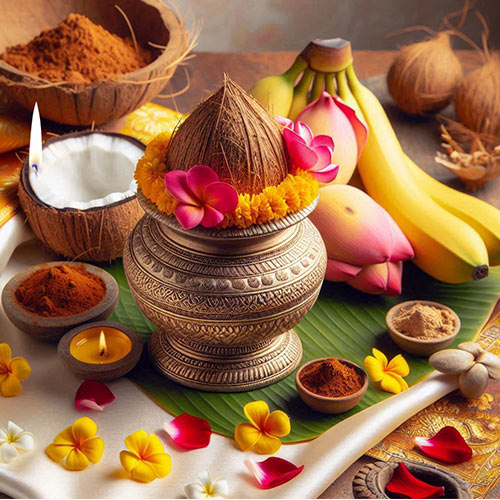
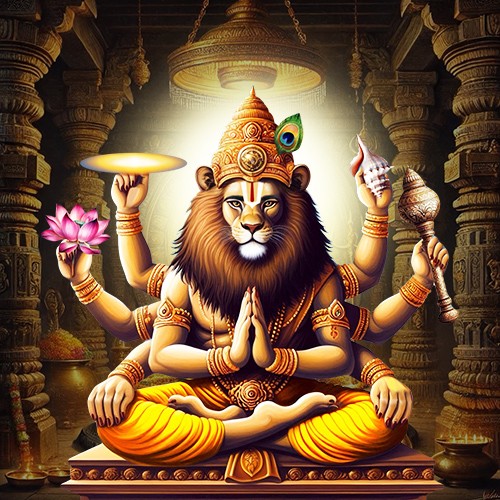
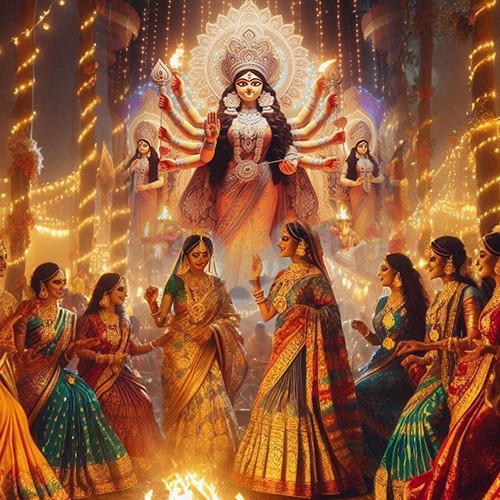
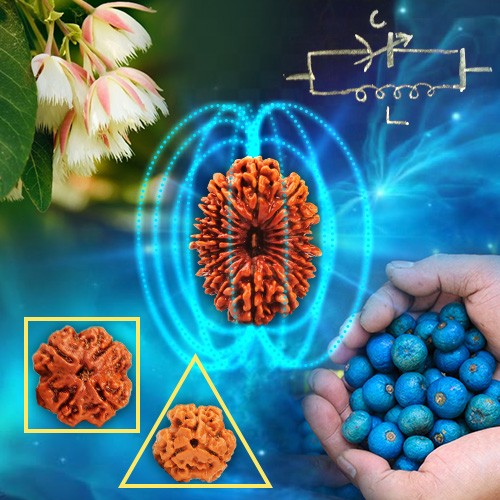

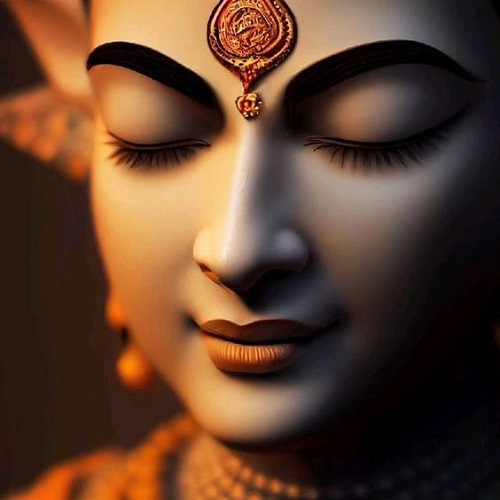
.jpg)
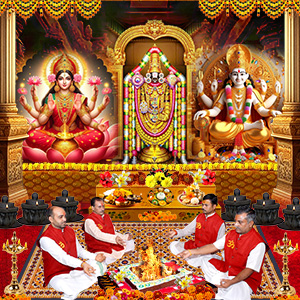
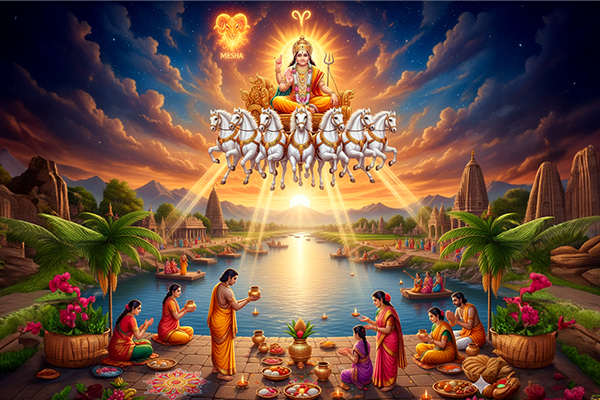
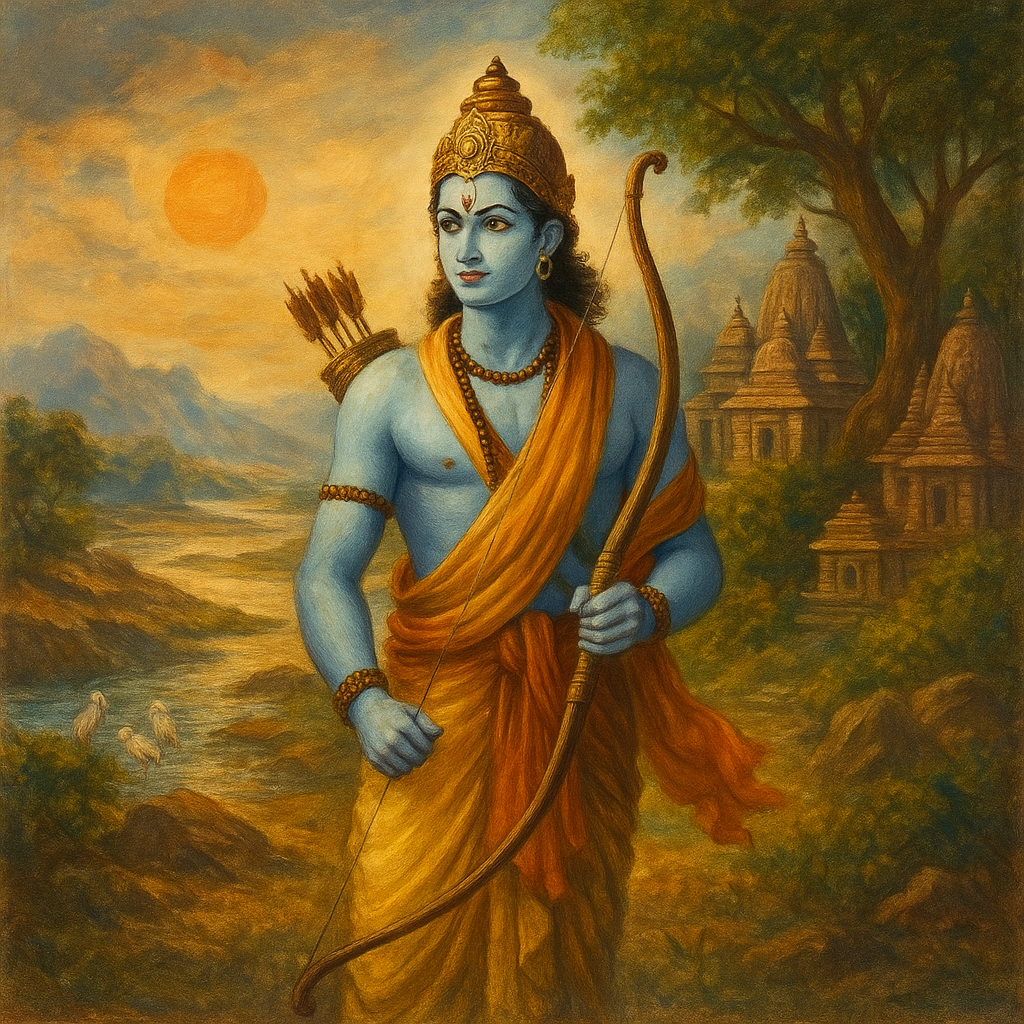
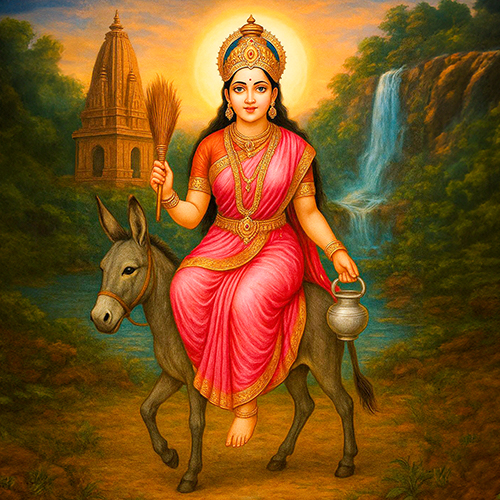
Comments 0
Leave your thought here